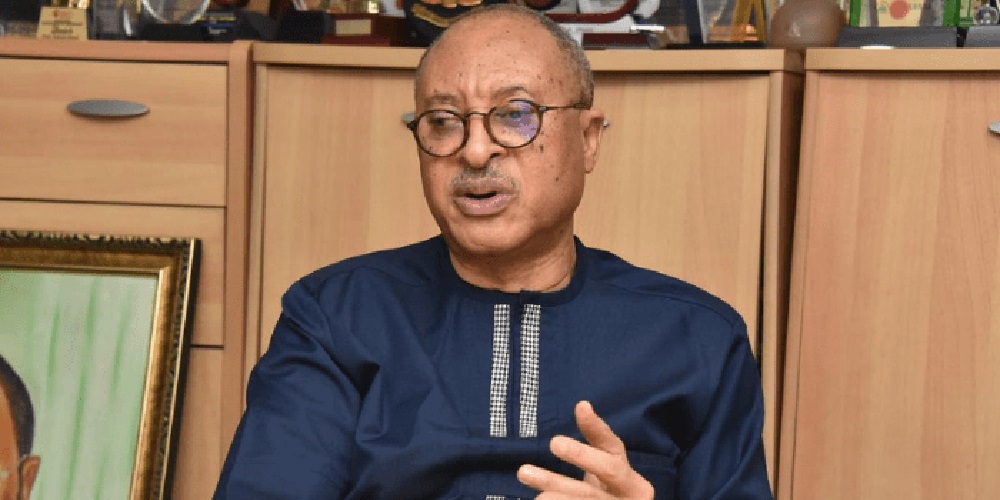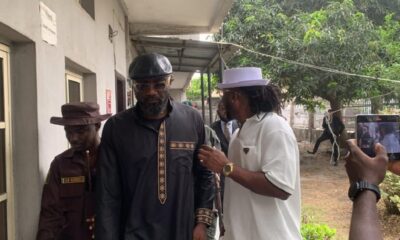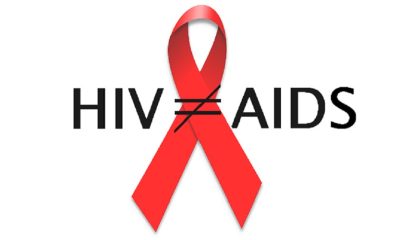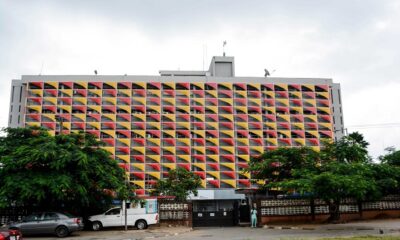News
NAFDAC alerts Nigerians on circulation of fake cancer drug

By Kayode Sanni-Arewa
The National Agency for Food and Drugs Administration and Control has alerted healthcare providers and the public about a suspected counterfeit batch of Phesgo 600mg/600mg/10ml injection, labelled with batch number C5290S20
According to NAFDAC, the counterfeit product was flagged after a complaint from a doctor at the Lagos University Teaching Hospital.
This was contained in a statement NAFDAC shared on its official X handle on Thursday.
NAFDAC disclosed that a doctor at the hospital reported that the suspected counterfeit drug, brought in by a patient, matched another previously identified counterfeit batch, C3809C51.
NAFDAC stated further that the Marketing Authorisation Holder, Roche, reviewed images of the suspected product and confirmed it as falsified, adding that Roche identified several inconsistencies, including a non-existent batch number, incorrect language, missing tamper-evidence features and mismatched labels compared to genuine products.
The statement reads, “The National Agency for Food and Drugs Administration and Control (NAFDAC) wishes to inform healthcare providers and the public of a report of a suspected counterfeit Phesgo® 600mg/600mg/10ml, labelled with batch C5290S20.
“The Marketing Authorization Holder (MAH) Roche received a complaint from a doctor at Lagos University Teaching Hospital (LUTH-NSIA) reporting a suspected counterfeit Phesgo® 600mg/600mg, labelled with batch C5290S20. The product was reported to have been brought in by a patient for administration. It had not been administered at the time of the report, as it matched the previously reported counterfeit batch C3809C51.
“Although no sample was returned to Roche for investigation, only pictures displaying parts of a Phesgo® 600mg/600mg in a 10ml folding box and a labelled vial. Images of the suspected product were examined by Roche and compared to the genuine samples retained for reference. The investigation identified the following significant differences between the complaint sample pictures and the genuine materials which confirmed the falsified status of the suspected counterfeit batch of Phesgo® 600mg/600mg.”
The agency emphasised the risks of counterfeit drugs, warning that they undermine the safety and effectiveness of medicines.
It urged importers, distributors, and healthcare professionals to be vigilant and ensure medical products are sourced from authorised suppliers.
Healthcare providers and consumers were advised to report any suspected counterfeit drugs to NAFDAC via their offices, helpline, or email.
“All NAFDAC zonal directors and state coordinators have been directed to carry out surveillance and mop up the counterfeit products within the zones and states. Importers, distributors, retailers, healthcare professionals and caregivers are hereby advised to exercise caution and vigilance within the supply chain to avoid importing, distributing, selling, and using counterfeit products. All medical products must be obtained from authorized/licensed suppliers.
“The products’ authenticity and physical condition should be carefully checked. Healthcare professionals and consumers are advised to report any suspicion of the sale of substandard and falsified medicines or medical devices to the nearest NAFDAC office, or call NAFDAC on 0800-162-3322 or via email: sf.alert@nafdac.gov.ng.
“Similarly, healthcare professionals and patients are also encouraged to report adverse events or side effects related to the use of medicinal products or devices to the nearest NAFDAC office, or through the use of the E-reporting platforms available on the NAFDAC website www.nafdac.gov.ng or via the Med- safety application available for download on android and IOS stores or via e-mail on pharmacovigilance@nafdac.gov.ng, ” it advised
The agency reassured the public that efforts to identify and remove counterfeit products from circulation were ongoing.
News
500 lawyers set to defend Utomi against DSS

A professor of Political Economy, Pat Utomi, on Friday said he is receiving support from some Nigerians who are planning to mobilise 500 lawyers to defend him against the Department of State Services.
Utomi revealed this in a post on X.
“It’s energising (that) some want to put together 500 lawyers to defend me against the DSS,” he said.
The DSS had sued Utomi over his alleged plan to establish what he calls “a shadow government” in the country.
According to the suit filed at the Federal High Court in Abuja, the DSS prayed the court to declare the move an attack on the Constitution.
The professor of Political Economy, who is the 2007 presidential candidate of the African Democratic Congress (ADC), was sued as the sole defendant.
In the suit filed on May 13 by a Senior Advocate of Nigeria, Akinlolu Kehinde, the agency contended that the move by Utomi was intended to create chaos and destabilise the country.
The DSS had argued that the planned shadow government was not only an aberration but also constituted a grave attack on the Constitution and a threat to the democratically elected government currently in place.
However, Utomi said he was gladened by the solidarity he had received from across the country.
“I am heartened by messages of solidarity from across Nigeria on this shadowy business of chasing shadows of shadow cabinets. Reminds me of the Nigeria I used to know. I want to thank all.”
The planned shadow cabinet was greeted by reactions from several Nigerians, including a former presidential candidate and activist, Omoyele Sowore, who said it was an ineffective symbolic gesture that lacked real-world impact on Nigeria’s pressing challenges.
Speaking during an interview on Inside Sources on Channels TV on Sunday, Sowore argued that the idea of a shadow cabinet was futile in a country where the existing government is itself opaque and largely unaccountable.
He said, “Well, how do you replace a shadow government with another set of shadowy governments? I would not begrudge anybody who thinks of solutions that can bring awareness to the people.
“But I do not think that setting up a government with names of people who call themselves a shadow government makes any difference.”
News
Police Speaks on Viral Video of Young Men Arriving in Ibeju-Lekki

The Lagos State Police Command has issued an official statement addressing a viral video that sparked concern on social media, showing a large group of young men reportedly arriving in Lagos and gathering near the Dano Company premises in Ibeju-Lekki.
According to the Command, the incident occurred on May 14, 2025, prompting swift deployment of officers to the scene for investigation. The police confirmed that the individuals—eighty-nine in total—had arrived from Katsina State to work as labourers at the Dangote Refinery in Lekki.
A contractor affiliated with the refinery informed the police that he personally recruited the workers for legitimate employment, a statement corroborated by the refinery’s Chief Security Officer (CSO). All individuals were cleared for entry and are expected to reside within the refinery premises.
The police confirmed that thorough checks were conducted, revealing no incriminating materials. The labourers also presented valid National Identification Numbers (NINs), which were successfully verified by the authorities.
Commissioner of Police, CP Olohundare Jimoh, urged the public to refrain from spreading unverified information that could incite panic or tension. He assured residents of the Command’s continued commitment to public safety and swift response to potential threats.
Police Public Relations Officer, CSP Benjamin Hundeyin, signed off on the statement, reaffirming the Command’s dedication to transparency and law enforcement in Lagos State.
News
Finland charges Simon Ekpa with inciting terrorism

Finnish prosecutors on Friday said they had charged a man with inciting terrorism online who a media report identified as Nigerian separatist leader Simon Ekpa.
Finland’s National Prosecution Authority said in a statement that it had charged “a Finnish individual in a case involving suspected public incitement to commit crimes with terrorist intent and participation in the activities of a terrorist group.”
It added that the alleged crimes had been committed in the city of Lahti between 2021 and 2024 and were related to the suspect’s efforts to establish Nigeria’s Biafra region as an independent state.
The prosecution authority did not name the accused but Finnish public broadcaster YLE identified him as separatist leader Simon Ekpa.
Ekpa — who claims to lead the Biafra Republic’s government in exile — was detained in November.
According to the prosecution authority, the accused remained in custody and denied the charges.
Ekpa is known as a self-proclaimed leader of a faction of the Indigenous People of Biafra (IPOB), which is pushing for the independence of Nigeria’s southeast, where a bloody civil war was fought in the late 1960s.
The dual Finnish-Nigerian national has also been a local representative for Finland’s conservative National Coalition Party in the city of Lahti, north of Helsinki, where he has served on a public transport committee.
When Ekpa was arrested, Finnish authorities also requested that four other people be remanded in custody on suspicion of financing Ekpa’s activities.
On Friday, the prosecution authority said the prosecutor had decided to drop charges against four others in the case due to a lack of evidence.
Ekpa has been the subject of several of AFP’s fact checks in recent years over false claims and disinformation he has made in independence campaigning.
AFP
-

 News8 hours ago
News8 hours agoINSECURITY! Ten killed in Plateau over attack linked to cattle rustling, farm destruction
-

 Health16 hours ago
Health16 hours agoLassa fever claims 138 lives in 2025, cases spread to 18 states – NCDC
-

 Economy11 hours ago
Economy11 hours agoSEE Current Black Market Dollar (USD) To Naira (NGN) Exchange Rate
-

 News16 hours ago
News16 hours agoNkechi Blessing Confirms Break Up With Lover
-

 News15 hours ago
News15 hours agoCourt nullifies Edo LG chair, deputy’s impeachment
-

 Entertainment11 hours ago
Entertainment11 hours agoChris Brown Reportedly Nabbed in Manchester
-

 News15 hours ago
News15 hours agoCourt convicts 10 Thai sailors, vessel for cocaine trafficking
-

 News15 hours ago
News15 hours agoSenate mulls terrorism charges for oil theft offenders
















